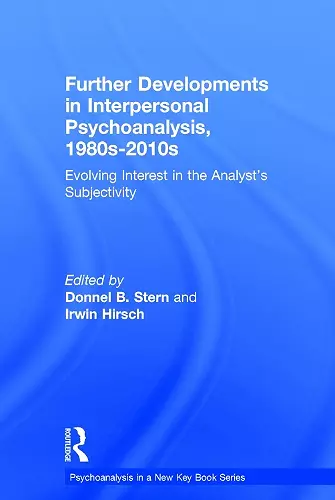Further Developments in Interpersonal Psychoanalysis, 1980s-2010s
Evolving Interest in the Analyst’s Subjectivity
Irwin Hirsch editor Donnel B Stern editor
Format:Hardback
Publisher:Taylor & Francis Ltd
Published:12th Dec '17
Currently unavailable, and unfortunately no date known when it will be back
This hardback is available in another edition too:
- Paperback£39.99(9781138578128)

Further Developments in Interpersonal Psychoanalysis, 1980s-2010s is the second collection of selected classic articles of the modern era by psychoanalysts identified with the interpersonal perspective. The first, The Interpersonal Perspective in Psychoanalysis, 1960s-1990s presented articles by second and third generation interpersonalists. This book contains those written by the third and fourth generation of interpersonal psychoanalysts.
The articles selected by the Editors for this second book extend the theme of transference and countertransference that was the throughline of the first book, lending even greater significance in clinical practice to the analyst’s subjectivity and its relation to the patient’s mind. One chapter after another in this book reveal ways that the analyst’s experience can lead to a greater appreciation of the patient’s unconscious experience. It is because of papers such as these that interpersonal psychoanalysis has been described as the origin, at least in North America, of the contemporary clinical interest in psychoanalytic subjectivity. As in the first, the articles in this second book include classic contributions from Bromberg, Greenberg, Hirsch, Mitchell, Levenson, Stern, and Wolstein; these writers are joined here by Blechner, Bonovitz, Buechler, Fiscalini, Held-Weiss, Kuriloff, and White.
North American psychoanalysis has long been deeply influenced and substantially changed by clinical and theoretical perspectives first introduced by interpersonal psychoanalysis. Yet even today, despite its origin in the 1930s, many otherwise well-read psychoanalysts and psychotherapists are not well informed about the field. Along with its companion work, this bookprovides a superb starting point for those who are not as familiar with interpersonal psychoanalysis as they might be. For those who already know the literature, the book will be useful in placing a selection of classic interpersonal articles and their writers in key historical context.
"This outstanding new volume takes the reader on a highly informative guided tour of developments in interpersonal psychoanalysis from the 1980s to the present. Stern and Hirsch have done far more than assemble a group of influential papers. Their erudite commentaries place these contributions in a context that allows the reader to appreciate both bold developments and nuanced changes in the field. The result is a wonderful compendium that will be informative to experienced analysts and beginners alike."-Glen O. Gabbard, MD, Editor, Textbook of Psychoanalysis.
"Moving beyond its origins and early period (1960s-1990s), the chapters in this book present the further evolution of the interpersonal perspective –arguably, the most American school of psychoanalysis. Stern & Hirsch identify the core features of this school that distinguish it from other psychoanalytic perspectives, including other relational approaches. Placing the interpersonal approach within the larger psychoanalytic context makes these volumes essential reading at teaching and training centers, especially those that have not been immersed in the interpersonal tradition; and provides writers and scholars an authoritative source for its ideas and concepts."-Bonnie E. Litowitz, Ph.D., Faculty, Chicago Institute for Psychoanalysis, Editor-in-Chief, Journal of the American Psychoanalytic Association (JAPA).
"This book makes an invaluable contribution to our field. In compiling and editing this wide-ranging and fascinating collection of articles by prominent relational analysts, Hirsch and Stern have done a magnificent job of providing a comprehensive overview of some of the most important and innovative work carried out by relational analysts in recent times. For anyone interested in the growth and development of relational psychoanalysis, especially its exploration of, and innovative contributions to, subjectivity in the analytic process, this book is essential reading."-Theodore Jacobs, author of The Possible Profession: The Analytic Process of Change.
"This outstanding new volume takes the reader on a highly informative guided tour of developments in interpersonal psychoanalysis from the 1980s to the present. Stern and Hirsch have done far more than assemble a group of influential papers. Their erudite commentaries place these contributions in a context that allows the reader to appreciate both bold developments and nuanced changes in the field. The result is a wonderful compendium that will be informative to experienced analysts and beginners alike."-Glen O. Gabbard, MD, Editor, Textbook of Psychoanalysis.
"Moving beyond its origins and early period (1960s-1990s), the chapters in this book present the further evolution of the interpersonal perspective –arguably, the most American school of psychoanalysis. Stern & Hirsch identify the core features of this school that distinguish it from other psychoanalytic perspectives, including other relational approaches. Placing the interpersonal approach within the larger psychoanalytic context makes these volumes essential reading at teaching and training centers, especially those that have not been immersed in the interpersonal tradition; and provides writers and scholars an authoritative source for its ideas and concepts."-Bonnie E. Litowitz, Ph.D., Faculty, Chicago Institute for Psychoanalysis, Editor-in-Chief, Journal of the American Psychoanalytic Association (JAPA).
"This book makes an invaluable contribution to our field. In compiling and editing this wide-ranging and fascinating collection of articles by prominent relational analysts, Hirsch and Stern have done a magnificent job of providing a comprehensive overview of some of the most important and innovative work carried out by relational analysts in recent times. For anyone interested in the growth and development of relational psychoanalysis, especially its exploration of, and innovative contributions to, subjectivity in the analytic process, this book is essential reading."-Theodore Jacobs, author of The Possible Profession: The Analytic Process of Change.
ISBN: 9780415714297
Dimensions: unknown
Weight: 612g
336 pages